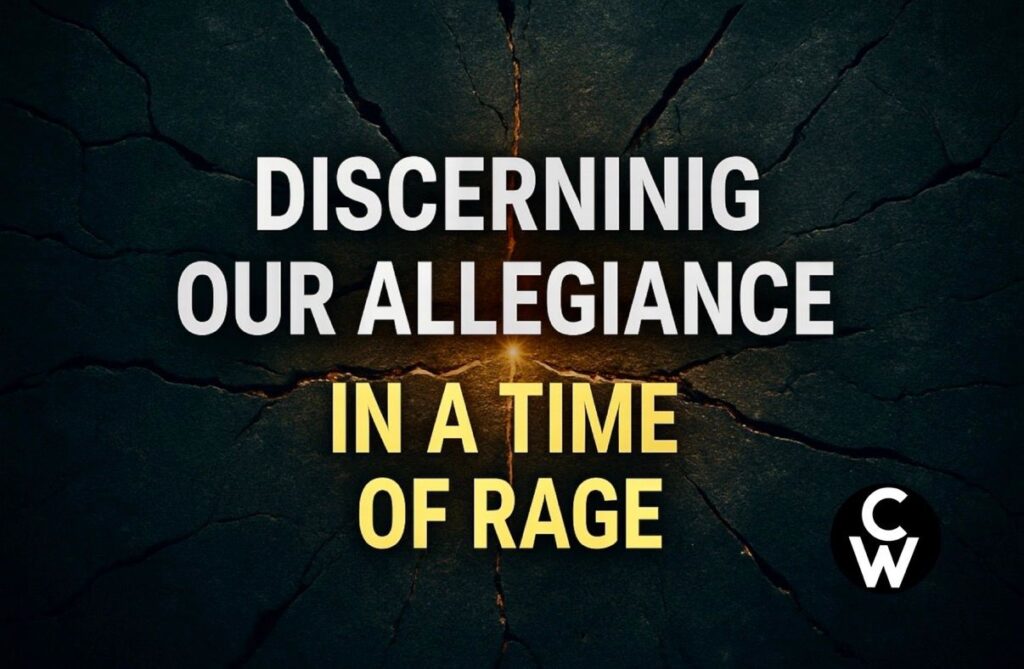Our world feels heavy right now. Emotions are stretched thin—fear, grief, and outrage simmer close to the surface.
When emotions are high, discernment often runs low. That’s when we are most vulnerable to being manipulated, and when
culture’s loudest voices have the easiest time shaping how we think and feel.
Scripture warns us that:
“A time is coming when people will no longer listen to sound and wholesome teaching.
They will follow their own desires and…look for teachers who will tell them whatever their itching ears want to hear.”
(2 Timothy 4:3–5 NLT)
We live in that time.
A Culture Problem
Much of today’s media thrives on outrage. Anger is the fuel that drives clicks, views, and loyalty.
The formula is simple:
• Outrage energizes. Unlike sadness, anger makes people stay tuned in.
• Outrage simplifies. It creates an “us vs. them” narrative that’s easy to digest.
• Outrage unites. People bond over shared anger at a common enemy.
The outcome? Truth becomes secondary. Nuance disappears. Opponents are no longer seen as human beings but as enemies to destroy.
Dehumanization takes root, and violence starts to feel not just possible, but acceptable.
A Heart Problem
But this isn’t only a cultural issue—it’s a heart issue.
Jesus reminded us that murder doesn’t begin with an act of violence; it begins in the heart. Anger and contempt are the seeds.
When we say—even silently—that another person is “worthless,” we’ve already stripped them of their dignity as image-bearers of God.
“You have heard that it was said to the people long ago, ‘You shall not murder…’
But I tell you that anyone who is angry with a brother or sister will be subject to judgment.”
(Matthew 5:21–22 NIV)
This is where the outrage machine finds fertile soil. It doesn’t create evil from nothing; it fans into flame what already burns in
human hearts. That’s why the problem transcends politics. It’s not just about “them.” It’s about all of us.
An Identity Problem
Scripture also reminds us of who we are:
“Dear friends, I warn you as temporary residents and foreigners to keep away from worldly desires
that wage war against your very souls.”
(1 Peter 2:11 NLT)
As believers, our ultimate citizenship is not tied to political parties or national identity—it is in heaven.
That truth reshapes how we respond in a time of chaos.
• Our hope is not in political victory, but in Christ.
• Our primary witness is not found in winning arguments, but in living with integrity.
• Our calling is to honor everyone—even those who oppose or insult us. (1 Peter 2:17)
Living as Wheat Among Weeds
Jesus told a story about wheat and weeds growing together (Matthew 13:24–30). The workers wanted to rip the weeds out immediately,
but the farmer warned that doing so would damage the wheat. He told them to wait until the harvest.
That parable speaks directly into our moment. We live in a world where good and evil exist side by side.
Our job is not to rip out the weeds by force. Our job is to be healthy wheat—to bear fruit that reflects Christ in the middle of the weeds.
That means cultivating love, joy, peace, patience, kindness, goodness, faithfulness, gentleness, and self-control (Galatians 5:22–23).
These qualities become our witness in a culture that thrives on the opposite.
A Call for Us
In a time of rage, the temptation is to pick a side, fight fire with fire, and let contempt rule.
But the way of Jesus calls us higher.
So together we pray:
• For families touched by violence.
• For our divided nation.
• For wisdom and discernment in our hearts.
• Even for those who commit evil—that they might be transformed by God’s mercy.
May we live as people of peace in a world that is tearing itself apart.
May we keep clear eyes, full hearts, and an unwavering allegiance to Christ alone.

